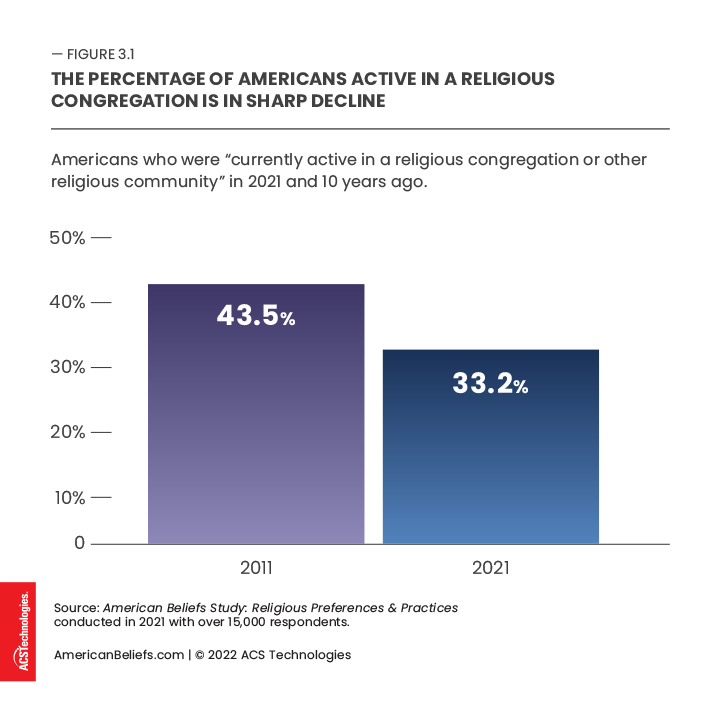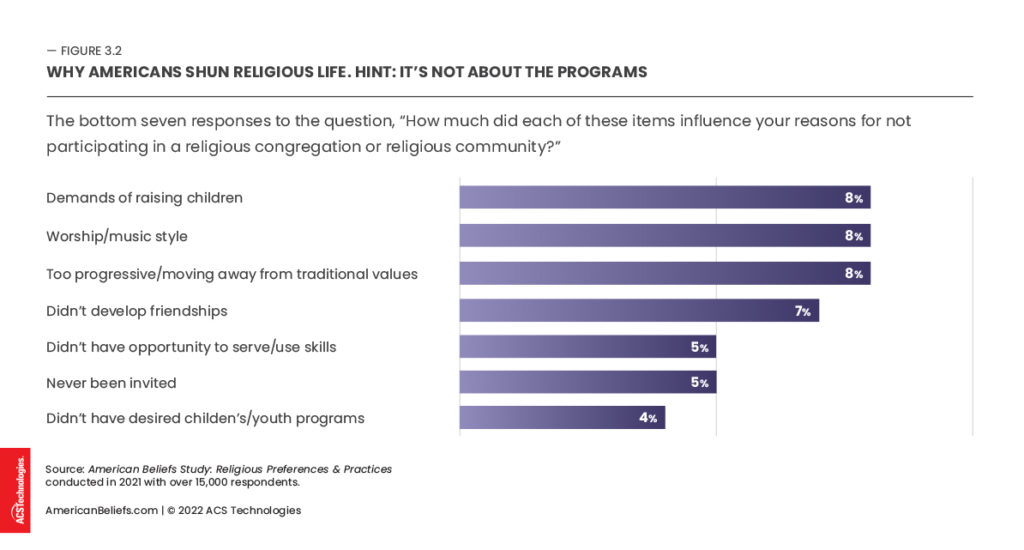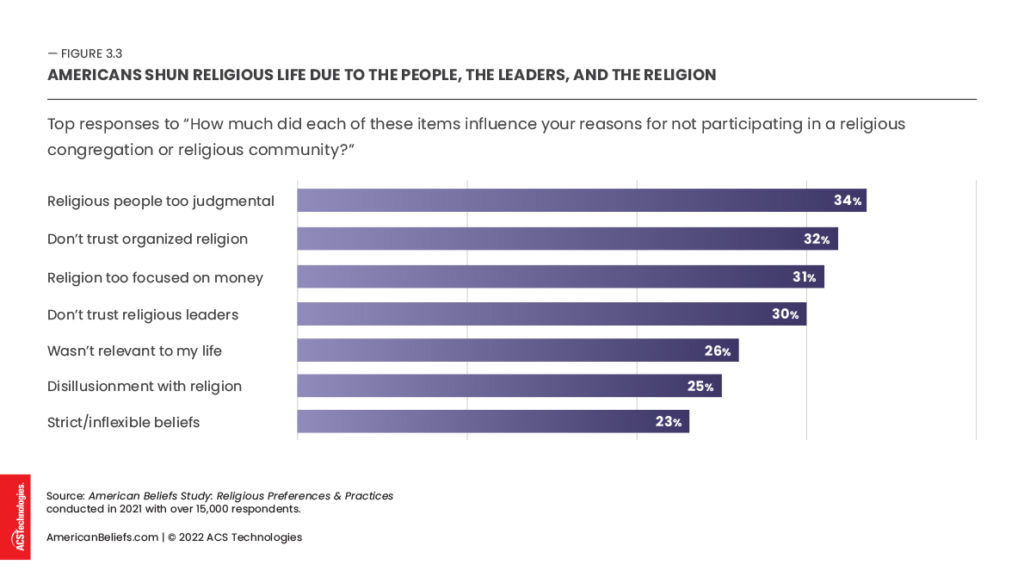Almost one-third of Americans say they are active in a church or other religious congregation (33.2%). That means two out of three Americans stay at home or do something else on Sunday morning. Ten years ago, the percentage who were active in a religious congregation was much higher at 43.5%. The level of participation has dropped by 10.3%, or 34 million people using the current U.S. population.
Over the past ten years, 34 million Americans have dropped out from active involvement in a church or religious congregation.
This finding is from the American Beliefs Study, which asked a carefully-designed, representative sample of 15,000 Americans if they were currently active in a religious congregation or other religious community. It also asked if they were active ten years ago.

Why the big exodus? Why did these tens of millions of people leave?
In the survey, those who said they were not currently active in a church or religious community answered a question about their reasons for not participating. They rated 25 different inhibiting reasons on how much each deterred their involvement, on a five-point scale, from ‘Not at all’ to ‘Very much.’ Their responses revealed which factors were – and were not – the main reasons for not engaging.
First, consider what showed up on the bottom of the list. These are the items the smallest share of participants identified as driving their non-involvement in a church or other religious congregation.

These answers tell us it’s not a change in worship style or music that’s keeping people from church life. It’s not a lack of connection in friendship with other members, a dearth of volunteer opportunities, or too few good children’s programs. Nor are people staying away because of life obligations like childcare. Only five percent said they hadn’t been invited.
The Factors
So what are the factors keeping people away, if not these?
Consider what showed up at the top of the list. These are the items that the largest share of respondents said were a factor driving their non-involvement in congregational life.

People choose not to participate in a church or religious community because they don’t feel good about religious people, organizations, leaders, and beliefs. It’s about their perceptions of the people, about the institutions, and about religious faith itself. More than a third feel religious people are judgmental. Many are disillusioned with religion, but even more distrust its leaders and its organizations. One in four don’t feel faith communities are relevant to their lives, and even more feel as if religious congregations are too focused on money.
The top reason why Americans shy away from religious life is that they see the members as judgmental instead of accepting.
This one is especially painful for Christians. Jesus said, “Judge not, that you be not judged” (Matthew 7:1). He also said, “By this all people will know that you are my disciples if you have love for one another” (John 13:35). Love drives out judgmentalism. Jesus set the example through his loving acceptance of people on the margins, outsiders, and people rejected by the community or by the religious leaders of his day. It is sad to learn that such a large percentage of Americans today do not see church people, and members of other religious congregations, as accepting and loving.
It can be easy for those of us who are Christians to feel defensive when we see these responses. We’re not so judgmental! We don’t focus too much on money! The gospel is absolutely relevant! Our leaders are good! … and so on. But that isn’t helpful. Whether these perceptions are fair or not, they are real. This study is just reporting what uninvolved people actually think and say. Debating may help cement a negative bias and come across as condescending.
What will help is to live, speak, and think in ways that shift these perceptions. It’s not necessary to defend Christians or churches in general. We only need to show the people around us that our church, our family of believers, is loving, accepting, good, worthy of trust, and sharing a message that is not only relevant but beautiful, wonderful, and powerful.
Key Findings:
- The share of Americans who participate in a faith community has dropped from 43.5% ten years ago to 33.2% today.
- Generally, people aren’t shying away from church because of a lack of good programs for children or youth, not being invited, nowhere to give back through volunteerism, or lack of friendship potential.
- For the most part, those who are not active in a church or religious congregation are staying away because of things like perceived judgmentalism of members, distrust of organized religion, perceived over-emphasis on money, and distrust of religious leaders.
- One in four Americans (25%) say they are “disillusioned with religion.” About the same proportion (26%) say religion “is not relevant” to their lives.
Ideas for Your Church:
Drop inaccurate ideas about why people stay away from church.
Don’t assume that programs, service opportunities, or better music will attract people to active church membership. These are all good, but they are not the key factors.
About this study
This online study among 14,942 American adults was conducted by Campbell Rinker for ACST from October 2020 through February 2021. Results were balanced by US region, 19 ‘Mosaic’ demographic clusters from Experian, and weighted by age to align with known population characteristics. The study carries a maximum margin of error of ±1.97% at the 95% confidence level within any US Census region. A comparative 2017 study involved the same size audience.
About the Authors
Dirk Rinker is president and CEO of Campbell Rinker, which has been a leading market researcher for nonprofits since the early 1990s. He has designed and implemented research projects for hundreds of prominent mission organizations, charities, universities, and museums in the U.S. and internationally – helping clients understand and act on the attitudes, motivations, and perceptions of their valuable constituencies.
Michael Jaffarian is a writer, researcher, and consultant to nonprofits. He and his wife were missionaries for 33 years, serving in Singapore, Virginia, Los Angeles, and England. Most of his ministry has been in global mission research. He has studied and written on growth trends among tens of thousands of Christian denominations globally.


